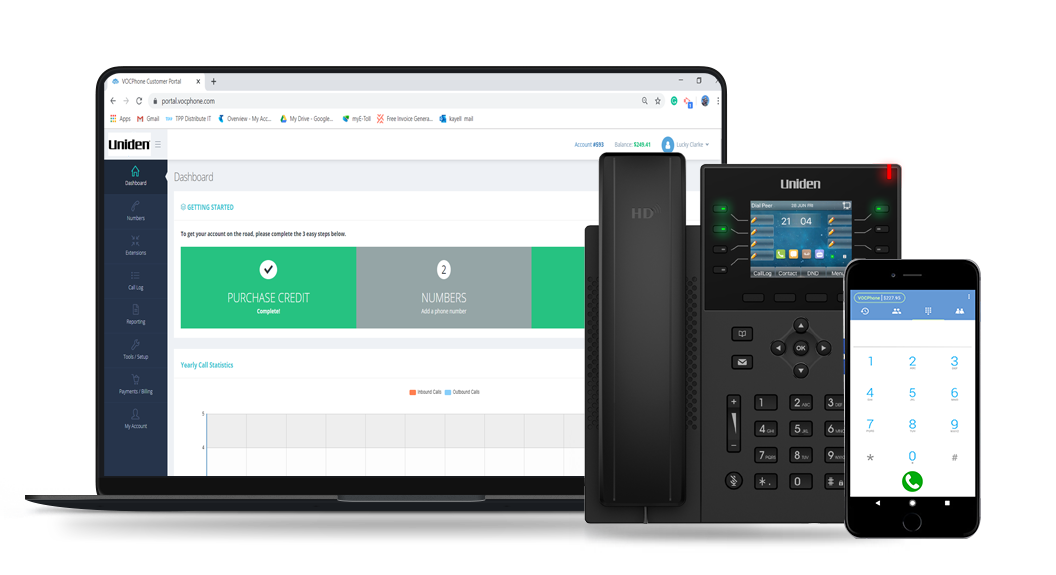
Smarter, faster, clearer: Why switching to an IP phone could transform communication
From missed calls to message delays, communication bottlenecks can grind productivity to a halt. But the right IP phone technology can fix that.

From missed calls to message delays, communication bottlenecks can grind productivity to a halt. But the right IP phone technology can fix that.
Communication is the backbone of any fast-moving industry, whether it’s logistics, hospitality, healthcare, or sales. But when systems lag, teams fall behind, and customer expectations go unmet. That’s where traditional phones often come up short.
An IP phone, or cloud business phone, which uses internet connectivity rather than traditional phone lines, offers a modern solution. With better call quality, seamless integrations, and flexible features, it helps companies stay agile and connected, no matter how busy the day gets.
Unlike outdated systems that rely on local infrastructure, these phones support remote work, mobile teams and multi-location operations, removing common barriers that slow communication. The result? Faster decisions, fewer missed messages, and stronger customer experiences.

These phones allow all your teams, whether in one office, multiple branches, or working remotely, to connect via the same communication system using the internet. This eliminates the delays and confusion caused by siloed systems or local phone lines. Employees can be reached on their direct extension anywhere, which reduces the time spent trying to track someone down. Managers can also monitor communications centrally, enabling more control over response times, availability and workflow efficiency. For fast-paced industries with field teams or rotating shifts, this ensures consistent communication and faster collaboration across departments.
One of the key strengths of a cloud phone system is its ability to integrate with your existing digital ecosystem, such as CRMs, project management platforms, help desk software, and calendars. For example, sales teams can see caller history and client data before they even answer the phone, allowing for more informed conversations. Support staff can log calls automatically in ticketing systems, reducing manual entry and errors. These integrations reduce the time spent switching between systems, improve customer experiences, and support a more agile response to queries, especially critical when handling multiple clients or high call volumes.
Instead of calls being lost in voicemail or left ringing in the wrong department, a business phone system can automatically direct calls based on time of day, team availability, or specific customer requirements. Interactive voice menus (IVRs) help guide callers to the right person without delay. Smart routing ensures that priority calls are sent to the best available agent while others can be queued, redirected, or sent to voicemail with follow-up automation. This system reduces call wait times, prevents internal back-and-forth, and ensures urgent matters don’t get delayed, keeping your operations moving smoothly, even at peak times.
With built-in support for mobile apps and desktop softphones, IP phones allow staff to stay connected from virtually anywhere. Field technicians, remote workers, and travelling executives can all use the same business phone system as in-office staff. This means fewer missed calls, more real-time updates, and no reliance on personal mobiles or patchy messaging apps. Calls can be transferred between devices, voicemails accessed remotely, and communications tracked in a central log. For fast-paced environments that require mobility, like logistics or healthcare, this level of access reduces silos and improves responsiveness across the board.
In healthcare, clear and fast communication can directly impact patient outcomes. These phones streamline communication between front desk staff, clinicians, departments, and external providers. Features like call prioritisation, paging, and voicemail-to-email ensure that critical updates and urgent requests are relayed quickly, even during high-volume periods.
In the world of logistics, every delay has a knock-on effect. These phones provide real-time communication between dispatch teams, drivers, and warehouse staff. Integration with tracking systems or CRMs ensures that staff can resolve delays, reroute deliveries, or update customers with precision, helping you avoid downtime, missed deadlines and customer frustration.
Hotels, resorts, and event venues rely on seamless service delivery across departments. A business phone system enables instant communication between the front desk, housekeeping, security and maintenance, and allows mobile teams to stay updated from any remote location. This results in quicker guest service, improved staff coordination and guest experience.
In retail environments, staff often work across multiple store locations or departments, making communication a challenge. With cloud-based phones, teams can instantly check stock levels or respond to customer enquiries without relying on external messaging apps or time-consuming transfers. It also helps the head office maintain visibility over branch-level activity.
For sales teams and contact centres, high call volumes and fast response times are typically the norm. Phones with CRM integrations, call analytics, and queue management tools empower agents to respond faster and work smarter. Managers can track performance in real time, reduce dropped calls, and ensure leads are followed up promptly, maximising every opportunity.
At Uniden, we’ve been helping Australian businesses stay connected for decades. Our advanced cloud-based phone systems are built for industries where every second counts, delivering the reliability, flexibility and integrations modern teams need. Whether you're scaling fast, going remote, or simply looking to reduce missed calls, our solutions are designed to simplify communications and keep your business moving forward.

Discover how a cloud-based business phone system tailored to your industry can streamline your operations.
It’s a communication device that uses the internet to make and receive phone calls. Unlike traditional phones, it converts voice into data and transmits it through your network.
You don’t need anything special, just a stable broadband connection. Higher call volumes or multiple users may benefit from business-grade internet for optimal performance.
Yes. cloud phones support softphone apps and remote extensions, allowing staff to stay connected via mobile or desktop devices wherever they are.
Absolutely. Most cloud-based phone systems offer encrypted connections and security protocols to ensure your calls and data remain protected.
Not at all. Our team makes the transition easy with guided setup, training, and support to get your team up and running without disruptions.